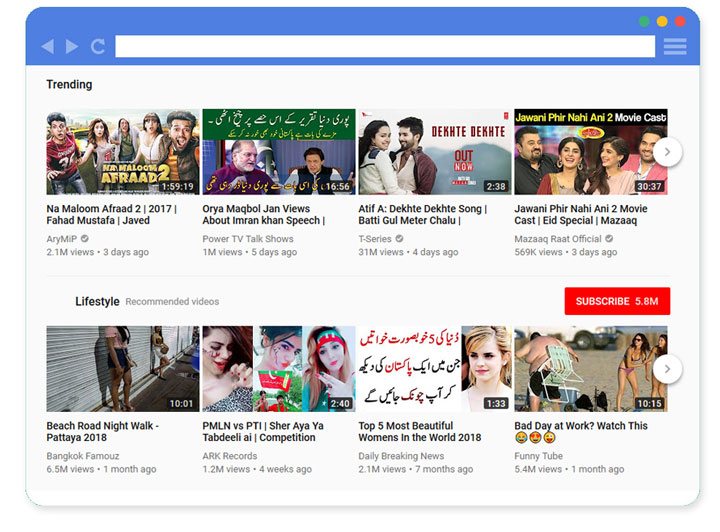The ultimate experience on YouTube is to have you watch an infinite amount of videos. If you ask Susan Wojcicki (YouTube's CEO), if her goal is to have the maximum number of people glued to the YouTube app in perpetuity, of course her answer will be no, and she will not be lying. We all know that spending an excessive amount of time in front of a screen is not a healthy behavior. But the fact is, this is exactly what the algorithm that serves you your next video is trying to do. And if it succeeds in doing it's job, you will watch videos in perpetuity.
How does YouTube determine what you should watch? The very first time you land on youtube.com, without an account, YouTube already has an idea what to show you. The only metrics they have at this point is your location from IP address, where you are accessing their page from. The trending section will show the most popular videos in your current location. For example, this is the list I get from Los Angeles:

And this is what you would see in Pakistan:

This is already better than having to show you random videos. By narrowing your option to the trending videos in your area, YouTube is increasing your likelihood to click on a video.
When you start watching a video, YouTube starts tracking metrics. First of all, it tracks the view. Then it starts tracking how long you watch the video. Every few seconds it pings the server saying how much of the video you have watched. This way if you close the browser, or leave the web page, it knows how much of the video you have watched. This is the reason why you can't game YouTube's algorithm by inflating page views. Because not only it counts the views, it also counts how long you have watched the video.

YouTube tracks these metrics for the millions of people that watch videos and extracts watching patterns. These patterns can be used to determine which video it should serve you next.
Watch a particular video in full, you are now part of a group of people who watched that video in full. In engagement metrics, fully watching a video is the ultimate goal, so it will look for all these people and determine among them, which video they have watched in full right after. That will be the video it will show you next.
Watch the video partially and hit the dislike button? You are now part of a group of people who watched that video and hit dislike. Again, because of the scale of YouTube, there is always enough people on their platform that have performed the same action. So they will look at the history of those people and see what was the video they have watched in full right after. That is the video that will appear in your feed next.
The more you watch videos, the more they can determine which videos you are most likely to watch. Of course there are other metrics that can be tracked. For example, I never get motivation videos on my feed, except on Sunday evening. Maybe I've been placed in a bucket of people that need motivational videos before heading to work on Monday.
At some point, YouTube has enough tracking metrics on you to determine what you are most likely to watch without even having you watch a video. When I got a cold, I got a video for natural remedy for the common cold pop on my phone without any interaction. The longer I will watch YouTube, the more tuned the machine will be to keep me on the platform for as long as possible. And this might mean watching the next recommended video forever and ever, until the heat death of the universe.

Exaggeration aside, this is not a feature unique to YouTube. All other social networks try to track the same information to determine how to keep you on their platform for as long as possible. Open that first page on your Instagram app and watch your brain struggle to fight the urge to click on that video. I can say with confidence that every single person that tried to show me something on Instagram, ended up being distracted for a minutes or two, until they remembered that they were supposed to show me something.
Why Facebook and Twitter insist on not showing you your friends posts in chronological order? It's because their algorithm determined a better way to keep you on their platform longer. So think about this, if you decide that you should close your Facebook account, the algorithm will place you in the group of people that want to close their account. There is a particular set of videos and posts that will increase your engagement with the platform. It may not change your mind about Facebook, but it will keep you on Facebook.
When the role of these machine learning algorithms is to keep us on a platform for as long as possible, they will try to collect as much data as possible to win the game.
The only reason we do not watch an infinite number of videos today is because we are human, and our human brain is weird. Your interest may suddenly change for unknown reasons, or untraceable metrics. You may stop what you are doing because you remembered it's your niece's birthday, or that you have to do your homework, or you are hungry, things that the algorithms, at the moment, cannot track.
But a new wave of machines is changing that. We are adding cameras in our homes, smart audio recorders that monitor everything we say 24/7. These new metrics will be fed to machine learning algorithms, and those will help determine better ways to make us more susceptible to clicking on the next video in perpetuity.





Comments(4)
Ilka :
Thank you for your clear explanation of how this algorithm works. I am aware of it, and so I often use these algorithms on different platforms to make my own searches for anything easier. But even though I know that I am manipulated to stay there for a long time, it is sometimes difficult for me to escape; it takes a lot of self-discipline.
Ibrahim author :
I'm glad you enjoyed it Ilka. What I find fascinating, it's that it actually works. Everytime I am trying to make a point about youtube, I am presented with the most compelling video that I just have to click!
Samb :
Je voudrais savoir combien YouTube gagne sur les nombres de vue.
Ibrahim author :
Ça serait une bonne idée. Mais ça depend de quel pub sera presenter, parce que chacune paye un prix different.
Let's hear your thoughts